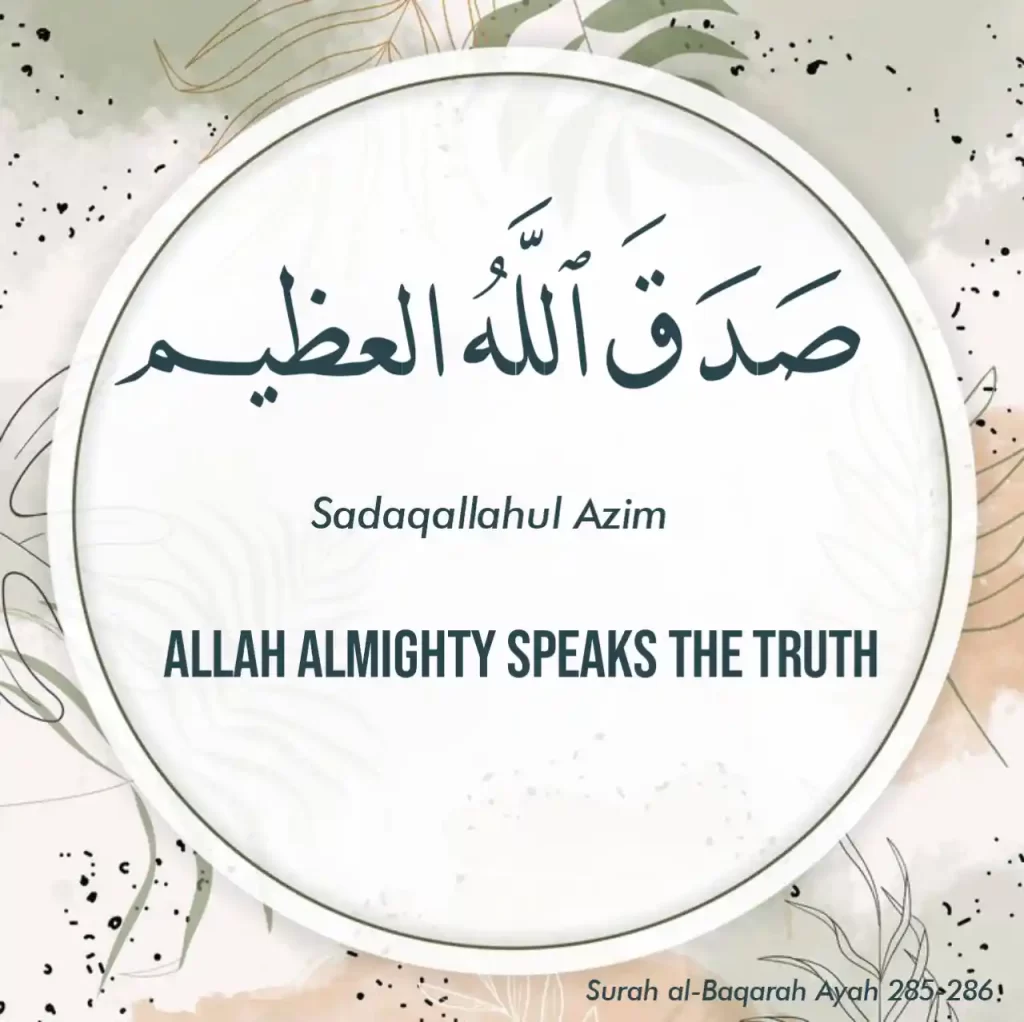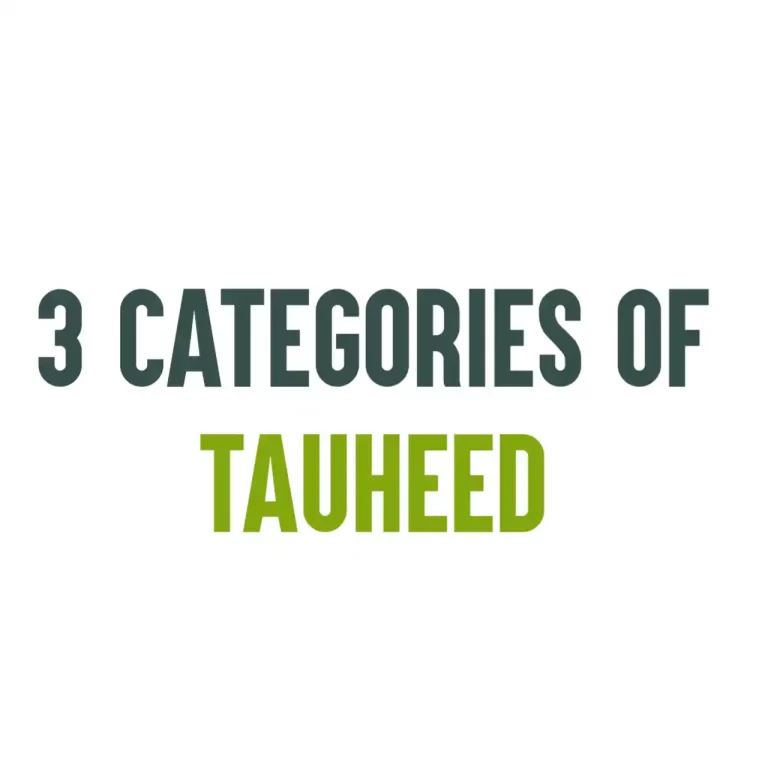Sadaqallahul Azim Meaning In English, Arabic Text, And Pronunciation
Sadaqallahul Azim is an Arabic phrase. This phrase is often recited by Muslims after their session of reading the Quran or after reciting a specific ayat or verse of the Quran.
Advertisements
In this blog post, we will explore the meaning and authenticity of this phrase in more detail.
Sadaqallahul Azeem in Arabic
This Arabic phrase is written in Arabic Text as:
صَدَقَ ٱللَّهُ العظيم
Common transliteration spellings:
Advertisements
- Sadaqallah ul Azeem
- Sadaq Allah ul azeem
- Sadak Allah al Azeem
- Sadaq allahul Azim
- Sadaq Allah El Azim
- Sadaqa Allah ulAzim
- Sadaqallahulazim
Meaning Of Sadaqallahul Azim in English
Sadaqallahul Azim means Allah The Great is Right or Allah Almighty speaks the truth or Allah The Great has spoken the truth. No doubt, Allah is the most truthful of all. Allah Says (interpretation of meaning): {and whose words can be truer than those of Allâh? (Of course, none). [Surah Any Nisa: 122]

Is Sadaqallahul Azim After Reading Quran Bidia?
Muslim scholars say that saying “Sadaqa Allahu Al-Azeem” after reciting the Quran or when listening to it is a bidah (innovation in religion).
According to IslamQA, there is no any basis for the people’s habit of saying “Sadaqa Allaahu al-‘Azeem” when they finish reading Qur’aan, so it should not be taken as a habit.
Indeed, according to the principles of sharee’ah it is more like bid’ah, if anyone believes that it is Sunnah. So this should not be done and should not be taken as a habit.
Sadaqallahul Azeem in Quran
In surah Al Imran, the third and second largest surah in Quran, verse 95, Allah SWT says:
Advertisements
“Say (O Muhammad): ‘Allaah has spoken the truth…’”
Aal ‘Imraan 3:95
With regard to the aayah, this is not speaking about this matter.
Rather Allaah was commanding him to explain to the people that Allaah had spoken the truth in what He had said in His Books, the Tawraat, etc., and that He had spoken the Truth in all that He had said to His slaves in the Tawraat, the Injeel and all other revealed Books.
And He was speaking the truth in all that He said to His slaves in His Book the Qur’aan.
Advertisements
But this is not evidence that it is mustahabb to say “Sadaqa Allaah al-‘Azeem” after reading the Qur’aan or after reading some aayahs or a soorah.
This was not reported or known from the Prophet (peace and blessings of Allaah be upon him) or his companions (may Allaah be pleased with them).

When Ibn Mas’ood recited to the Prophet (peace and blessings of Allaah be upon him) from the beginning of Soorat al-Nisaa’ until he reached the aayah (interpretation of the meaning):
“How (will it be) then, when We bring from each nation a witness and We bring you (O Muhammad) as a witness against these people?” [al-Nisaa’ 4:41]
The Prophet (peace and blessings of Allaah be upon him) said to him, “Enough.” Ibn Mas’ood said:
“I turned to him and saw that his eyes were filled with tears”, i.e., he was weeping because of the mention of this great status on the Day of Resurrection which is mentioned in this aayah, where Allaah says (interpretation of the meaning):
“How (will it be) then, when We bring from each nation a witness and We bring you” – O Muhammad – “as a witness against these people?” – i.e., against his ummah.
The point is that there is no basis in sharee’ah for adding these words – “sadaqa Allaah al-‘Azeem” – when finishing reading Qur’aan.
What is prescribed is not to do this, in accordance with the example of the Prophet (peace and blessings of Allaah be upon him) and his companions (may Allaah be pleased with them).
But if a person does that sometimes, without intending to, it doesn’t matter, for Allaah speaks the truth in all matters, may He be glorified and exalted.
But making that a habit every time one reads Qur’aan, as many people do nowadays, has no basis, as stated above.
- SUGGESTED READING:
- Amanar Rasulu Bima Unzila Ilayhi Arabic Text, and meaning
- Ya Hayyu Ya Qayyum Bi Rahmatika Astaghees Full Dua in Arabic And Meaning

Islam web stated that the fact that a person says: “Sadaqallah-ul-Atheem” is an absolute expression which should not be limited to a given time, place or situation without a clear evidence to do that.
So, since habitually saying this expression anytime one finishes reading the Qur’an or listening to it is not supported by any legal evidence, it is not permissible to do it.
If one says it as a form of worship this is unlawful as there should not be any innovation in worship.
If the person wants to conclude a reading in the best way, he should just remain silent. The Prophet once listened to Abdullah Ibn Massoud reading the Qur’an and when he wanted him to end his reading he said to him “That is enough“. [Reported by Imam Al Bukhari]
The Muslim should look to the Sunnah and abide by it instead of sticking to some innovated expressions or sayings which were not reported from the Prophet.
Such expressions might become so widely used and so common that people take them as Sunnah.
So, if the pupils and students grow up repeating this expression after reading any verse of the Qur’an then, they would think that it is Sunnah while it is not.
Allah knows best.
Advertisements







